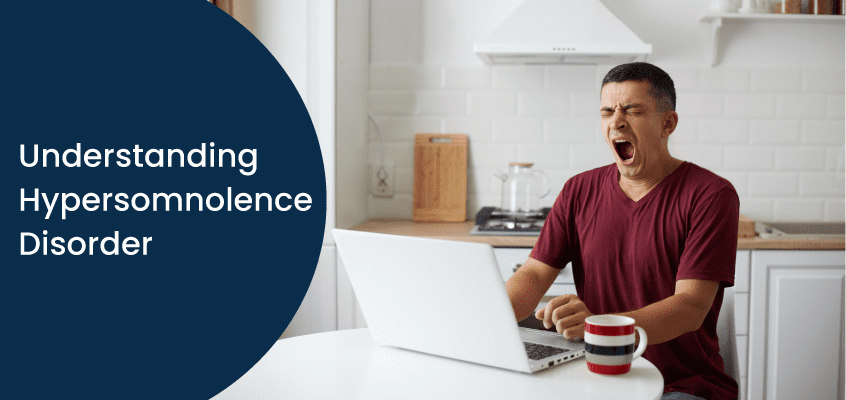Introduction
Excessive sleepiness is common in sleep-deprived individuals and is not a cause of concern until it starts disrupting regular life. The problem is when you get adequate sleep at night but still struggle to remain awake in the daytime. It is called hypersomnolence disorder.
Hypersomnolence is not a disorder but a symptom of other health conditions such as multiple sclerosis, hypothyroidism, epilepsy, encephalitis, Parkinson’s disease, obstructive sleep apnea and obesity.[1]
What is hypersomnolence disorder?
Hypersomnolence disorder is when you feel incredibly sleepy during the daytime despite sufficient sleep at night. People with this condition fall asleep several times during the day, which affects their ability to function normally and increases the risk of accidents.[2]
Hypersomnolence disorder is of three types. These are based on how long the condition lasts:
-
Acute hypersomnolence: This phase lasts about a month or less.
-
Subacute hypersomnolence: This phase can last between one to three months.
-
Persistent hypersomnolence: This phase can last more than three months.
Hypersomnolence disorder is of two types when it comes to the causes:
-
Primary: This is hypersomnolence without any medical condition and with just one symptom, i.e. excessive fatigue.
-
Secondary: This is hypersomnolence caused due to some other medical condition like Parkinson’s disease, sleep apnea, chronic fatigue syndrome and kidney failure. Such situations can cause poor and inadequate sleep at night, resulting in daytime sleepiness.
Hypersomnolence is not the same as narcolepsy. Narcolepsy is a neurological condition that causes unpreventable sleepiness during the daytime. Individuals with hypersomnolence can stay awake but still feel excessively tired.
The severity of this condition ranges from mild to severe. Severe cases of hypersomnolence can cause impaired work or school performance because of excessive sleepiness. Women suffer more from this condition than men.
Symptoms of hypersomnolence disorder
Some common signs of hypersomnolence disorder include[3]:
-
Recurrent episodes of excessive daytime sleepiness
-
Difficulty leaving the bed in the morning, or a form of sleep drunkenness
-
Feeling combative or confused after daytime naps
-
Sleeping ten or more hours at night yet feeling sleepy during the day
-
Unrefreshing daytime naps that do not improve alertness
-
Decreased energy
-
Anxiety and irritability
-
Headaches
-
Restlessness
-
Slow speech, slow thought processes, memory issues, and inability to concentrate or focus
-
Hallucinations
-
Loss of appetite.
More information about- Narcolepsy
Causes of hypersomnolence disorder
The causes of hypersomnolence disorder include[3]:
-
Medical conditions such as epilepsy, Parkinson’s disease, multiple sclerosis, hypothyroidism, encephalitis or brain inflammation and obesity
-
Tumours, diseases of the nervous system and traumatic injuries
-
Medicines like anticonvulsants, sedatives, antipsychotics and opioids
-
Withdrawal from stimulant drugs
-
Alcohol and drug abuse
-
Insufficient sleep syndrome – a health condition when a person fails to get sufficient sleep persistently
-
Working night shifts, chronic pain, poor sleep hygiene and excessive partying
-
Mood disorders such as depression, bipolar disorder, and seasonal affective disorder
-
Central nervous system disorders such as Kleine-Levin syndrome and narcolepsy
-
Psychiatric disorders such as depression and anxiety
-
Genetics or having relatives with the condition.
Read more about I am not able to sleep
Tests of hypersomnolence disorder
Initially, a doctor will enquire about the individual’s symptoms, sleep history and medical history. They may ask you to maintain a sleep diary to track your sleep and wake patterns. Or you could use an actigraphy sensor, a small, watch-like device worn on the wrist to keep track of the sleep-wake cycle.
Other tests of hypersomnolence disorder include:
-
Polysomnography: This is an overnight sleep study that measures the brain waves, heart rhythms, muscle movements and breathing patterns of an individual during different stages of sleep. Polysomnography is performed at sleep study centres, hospitals or any other designated place under the supervision of a sleep expert. This test helps diagnose all kinds of sleep-causing disorders.
-
Multiple sleep latency tests: This daytime sleep test measures the individual’s tendency to fall asleep during five 20-minute nap trials scheduled a few hours apart. It tracks brain activity, including REM sleep.
-
Sleep questionnaires: People must complete questionnaires to rate their level of sleepiness.
Must Read – hypersomnia
Treatment of hypersomnolence disorder
The treatment of hypersomnolence disorder can vary according to the condition’s cause. But lifestyle changes and medicines can primarily help a person with hypersomnolence disorder. These include:
Medication
-
Wakefulness-promoting drugs can treat hypersomnolence disorder symptoms.
-
The secondary line of treatment includes psychostimulants such as methylphenidate, amphetamine, and dextroamphetamine.
Lifestyle changes
-
Establishing a regular sleep schedule
-
Establishing a bedtime routine
-
Creating a relaxed, dark environment
-
Using comfortable bedding and pillows
-
Limiting distractions like screen time and caffeine before going to bed
-
Not consuming alcohol before retiring to bed
Conclusion
Although hypersomnolence disorder is not life-threatening, it can significantly affect a person’s quality of life. Talking to the life coaches and psychologists at United We Care is an excellent idea. Our online mental health platform can help you cope with the significant challenges of hypersomnolence disorder with support groups and counselling. Contact us today!









